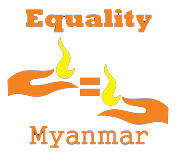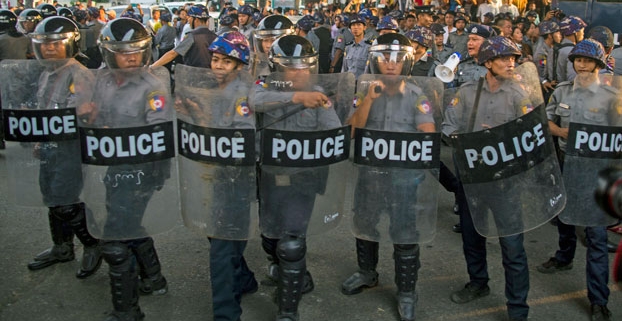Human Rights Watch on Thursday urged the Japanese government to drop a plan to donate 100 million yen (U.S. $934,300) to buy vehicles and communications equipment for the Myanmar Police Force to use to protect dignitaries, arguing that the police are partners with the army in widespread abuses.
Japan’s Foreign Ministry announced the plan on July 2, describing it as a modernization effort aimed at “strengthening the capabilities of police agencies in various fields” and “updating equipment that had not been replaced for more than 20 years in a country vulnerable to terrorism, illegal drug trafficking, and human trafficking.”
“Under this plan, by providing vehicles and radios for the protection of dignitaries, the police force in the country, which promotes democratization and civil servant reform, will be strengthened in security measures to stabilize the society and contribute to the economic and social development of the country,” said the Japanese Embassy website in Myanmar.
New York-based HRW said, however, that Myanmar’s police has worked hand-in-glove with the military during a spate of atrocities in recent years, particularly in Rakhine state, where they expelled more than 740,000 Muslim Rohingya in 2017 and now are brutalizing civilians in a war against ethnic Rakhine fighters.
“It’s inexplicable that the Japanese government would try to curry favor with Myanmar’s abusive security apparatus by providing financial assistance to the police,” said Brad Adams, HRW’s Asia director, in the statement issued Thursday.
“Instead of supporting Myanmar’s police, Japan should be helping the victims of rights abuses and ethnic cleansing by working with other donor governments to hold the security forces accountable,” he said.
Under the 2008 constitution drafted by the military, the Myanmar Police Force operates under the authority of the military-controlled Ministry of Home Affairs and outside the control of the civilian-led government, HRW noted.
In addition to working with the military in conducing the “clearance operations” in Rohingya Muslim communities in Rakhine state, the police played a part in violence against the Rohingya in 2012 and 2016, and are accused of committing human rights abuses against ethnic Rakhines in the 19-month armed conflict between the Myanmar military and rebel Arakan Army (AA) forces in northern Rakhine.
‘Playing real politics’
Phil Robertson, HRW’s deputy Asia director, said the move contradicted the Japanese government’s stated objective to use human rights principles to guide its policy of issuing financial assistance packages to Asia-Pacific countries.
“If they move forward with this grant of a significant amount of money for the Myanmar police, it will show that the government of Japan’s words are not true,” he told RFA.
“Japan says it cares about human rights, but the reality is that the more interested it is in playing real politics, the more it is interested in playing games to try to influence the government,” Robertson said. “It doesn’t care about human rights.”
HRW noted that Japan’s Foreign Ministry said it had confirmed with the Myanmar government that the aid should be used and maintained for its stated purposes.
The ministry also said that its embassy in Yangon would monitor whether the equipment was being used appropriately.
When RFA’s Myanmar Service contacted the embassy for comment, an official replied that someone would respond in a week.
Police Colonel Kyaw Thiha, spokesman for the Ministry of Home Affairs, told RFA by email that he had no comment on the issue. RFA could not reach the ministry’s director general, Khine Tun Oo, for comment.
‘Aiding an evil entity’
Some rights activists in Myanmar also lashed out about Japan’s plan to provide finds to the Myanmar Police Force.
“Our police forces are not under the control of the civilian government, [but]rather the control of the military [which]gives them full orders,” said Min Thway Thit from the All Burma Federation of Student Unions (ABFSU), who previously had been arrested and detained by police for peaceful protest activities.
“When the international community gives them humanitarian assistance, regardless of what type of aid it is, they are aiding an evil entity,” he said.
Aung Myo Min, executive director of the Yangon-based human rights education group Equality Myanmar, said it would not be easy for Japanese officials to follow how the money would be spent.
“There are examples of the authorities using grant funds for purposes other than what they were intended for,” he told RFA. “There are many dubious actions in the [police]force that should concern the civil community. Monitoring the use of [funds]by the force is easier said than done.”
But Moe Yan Naing, a former police captain who was fired and jailed for blowing the whistle on a police setup of two Reuters journalists who were reporting on the crackdown on the Rohingya, said that the police force needs to receive international assistance in order to change its ways.
“The police force should receive the aid, as it is still in transition,” he said. “If it receives aid, it will be very helpful for its progress” toward changing over to civilian control.
“We don’t know for sure when the police force will be completely under the civilian government,” he added. “In the meantime, the international aid could help speed up the police force’s reform process.”
Reported by Wai Mar Tun for RFA’s Myanmar Service. Translated by Ye Kaung Myint Maung. Written in English by Roseanne Gerin.


 Equality Myanmar (EQMM) is a leading nongovernmental organization that organises a wide range of human rights education and advocacy programs, the documentation human rights violations, and provides emergency support for activists, human rights defenders, and their families. We work with a range of local civil society organizations, educators, activists, various local actors, and our programs and activities reach all states and regions in Myanmar.
Equality Myanmar (EQMM) is a leading nongovernmental organization that organises a wide range of human rights education and advocacy programs, the documentation human rights violations, and provides emergency support for activists, human rights defenders, and their families. We work with a range of local civil society organizations, educators, activists, various local actors, and our programs and activities reach all states and regions in Myanmar.
